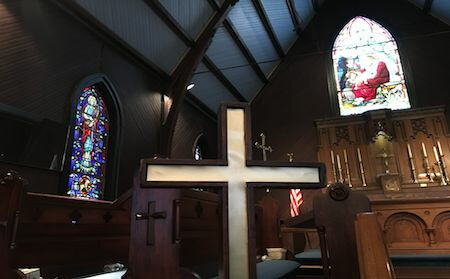Getting Ready for Sunday by the Rev. Canon Jordan Hylden

Matt. 3:13-17, The Baptism of our Lord
“He Fulfilled in Himself Every Sacrament of our Salvation”
“In Christ was the complete man,” wrote Hillary of Poitiers about Matthew’s story of the baptism of Jesus, “and in this way, having taken on his body in obedience to the Holy Spirit, he fulfilled in himself every sacrament of our salvation.” Early church Fathers like Hillary looked to the baptism of Jesus as the inauguration of our own baptisms: when we are baptized, we are given to stand where Christ stands before the eternal Father, to share in the outpouring of the Spirit and the Father’s good pleasure in his beloved Son. “This is my Son, whom I love; with him I am well pleased.” So too, in our baptisms: This is my very own son, you may call me your Father, for that is what I am.
We see in this baptism both the grace of the Incarnation, and the gift of the Atonement. Baptism in the Old Testament is both a purification ritual and an atonement for sin. Before entering the Temple, one does not simply waltz into the presence of the Almighty I AM; one must make ablutions, become pure. It is beyond our capacity to stand in God’s presence in the Holy of Holies: only God can lift us up so that we may. This is not simply to do with sin; it is to do with the infinite qualitative difference between God and humanity. “You may not look directly at my face; for no one may see me and live” (Ex. 33:20). That the eternal Word of the Father should take on our mortal, frail body; become a squirming, helpless child; eat with us and walk alongside us on the path of life: How vast a miracle this is! The Word did not need to do this, but by his Incarnation he purifies our humanity, lifting us up in Jesus and filling us with the Spirit’s life so that we may see God face-to-face, that we may be God’s friends. In the baptism of Jesus, we are given an outward and visible sign of this great grace, enacted now for us.
The baptism of John is also, to be sure, a baptism of “repentance for the forgiveness of sins” (Lk. 3:3). Just as the eternal Word did not need to be purified, lifted up and Spirit-filled to be made ready to stand in the eternal Father’s own presence, so too the beloved Son needs no forgiveness of sins. “I need to be baptized by you, and do you come to me?” Yes, Jesus does come, “to fulfill all righteousness.” And the baptism of Jesus is not finished here in the Jordan River. He asks his disciples later on, “Can you drink the cup I drink or be baptized with the baptism I am baptized with?” (Mark 10:38). The baptism of Jesus is completed only by his atoning death, by his taking on the powers of Sin and Death that hold us captive and giving us in exchange his righteousness and everlasting life. Jesus himself is not a baptizer during his ministry, and nor are his disciples until after his death and resurrection. Only after the Resurrection is the baptism of Jesus inaugurated, one that is indeed greater than the baptism of John because it is also a baptism into Christ’s death (Rom. 6:3).
The Oxford theologian Markus Bockmeuhl sums up the vast miracle of this baptism well: “Jesus’ baptism thus discloses Christologically what John Macquarrie once called the ‘super-sacrament’, by which he meant ‘a unique manifestation in visible form of the authentic life of God’. On this reading Christ himself is indeed both content and minister not only of baptism but also (as Hilary put it above) of every Christian sacrament. If this is correct, then Jesus as the Baptized One sanctifies and ‘activates’ the dominical gift of grace that comes to his people through their baptism: the outward and visible sign of the salvation of Adam and Israel.”
For a feast of rich theological reflection, I recommend the full essay by Markus Bockmeuhl: “The baptism of Jesus as ‘super-sacrament’ of redemption,” Theology 115(2) 83-91, March 2012.


